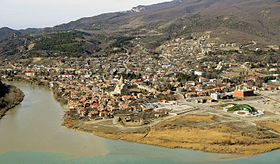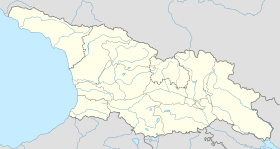Mtskheta
Mtskheta მცხეთა | |
|---|---|
Town | |
 | |
 Mtskheta Location of Mtskheta within Georgia Show map of Georgia  Mtskheta Mtskheta (Mtskheta-Mtianeti) Show map of Mtskheta-Mtianeti | |
| Coordinates: 41°51′N 44°43′E / 41.850°N 44.717°E / 41.850; 44.717 | |
| Country | |
| Mkhare | Mtskheta-Mtianeti |
| Municipality | Mtskheta |
| Established | 5th century BC |
| Population (2014)[1] | |
| • Total | 7,940 |
| Time zone | UTC+4 (Georgian time) |
| Climate | Cfa |
| Website | mtskheta-mtianeti.gov.ge |
Mtskheta (Georgian: მცხეთა [mtsʰxɛtʰɑ]) is a city in Mtskheta-Mtianeti province of Georgia. One of the oldest cities of Georgia, it is located approximately 20 kilometres (12 miles) north of Tbilisi, at the confluence of the Kura and Aragvi rivers.
Due to its historical significance and several cultural monuments, the "Historical Monuments of Mtskheta" became a UNESCO World Heritage Site in 1994. As the birthplace and one of the most vibrant centers of Christianity in Georgia, Mtskheta was declared as the "Holy City" by the Georgian Orthodox Church in 2014.[2]
In 2016 the Historical Monuments of Mtskheta were placed by UNESCO under Enhanced Protection, a mechanism established by the 1999 Second Protocol to the 1954 Hague Convention for the Protection of Cultural Property in the Event of Armed Conflict.[3]
Contents
1 History
2 Monuments
3 Threats
4 International relations
5 Notable people
6 See also
7 References
8 External links
History
Mtskheta was founded by the ancient Meschian tribes in the 5th century BC.[4] It was capital of the early Georgian Kingdom of Iberia from the 3rd century BC to the 5th century AD. It was a site of early Christian activity resulting in Christianization of Iberia, where Christianity was proclaimed the state religion in 337. It remains the headquarters of the Georgian Orthodox Church.
King Dachi of Iberia (early 6th century AD), who was the successor of Vakhtang I of Iberia, moved the capital from Mtskheta to the more easily defensible Tbilisi according to the will left by his father. However, Mtskheta continued to serve as the coronation and burial place for most kings of Georgia until the end of the kingdom in the 19th century.[citation needed]
The old city lies at the confluence of the rivers Mtkvari and Aragvi. The rare blend of cultural values had ruled in this part of the world since the Bronze Age until prosperous Christian era over the unique eclectic lifestyle creating the mood of the town which is as old as the history of Georgia. Mtskheta is the most religious city of Georgia as it has been the shrine of pagan idols since times immemorial and it is where Christianity in Georgia takes its origin.[citation needed]
In recognition of its role in the Georgian Christian history, Mtskheta was granted the status of a "Holy City" by Catholicos-Patriarch Ilia II of Georgia in accordance of the written testament of his 11th-century predecessor Melchizedek I of Georgia.[2]
Monuments
| UNESCO World Heritage site | |
|---|---|
| Criteria | Cultural: iii, iv |
| Reference | 708 |
| Inscription | 1994 (18th Session) |
| Endangered | 2009 — 2016[5] |
| Area | 3.85 ha |
| Buffer zone | 2,382.5 ha |

Svetitskhoveli seen from an old street
Svetitskhoveli Cathedral (11th century) and Jvari Monastery (6th century) in Mtskheta are amongst the most significant monuments of Georgian Christian architecture, and are historically significant in the development of medieval architecture throughout the Caucasus. Of special significance are early inscriptions, which form a valuable reference in the study of the origins of the early Georgian alphabet.[citation needed]

Jvari Monastery
In the outskirts of Mtskheta are the ruins of Armaztsikhe fortress (3rd century BC), the Armaztsikhe acropolis (dating to the late 1st century BC), remains of a "Pompey's bridge" (according to legends built by Roman legionnaires of Pompey the Great in the 1st century BC), the fragmentary remains of a royal palace (1st–3rd century AD), a nearby tomb of the 1st century AD, a small church of the 4th century, the Samtavro Monastery (11th century), and the fortress of Bebris Tsikhe (14th century). The Institute of Archaeology, and the garden of Mikheil Mamulashvili are also worthy of note.[citation needed] There is also a monument to sculptor Elena Machabell.

"Pompey's bridge", August 2008
Threats
The Historical Monuments of Mtskheta were recently placed on UNESCO's List of World Heritage in Danger, citing "serious deterioration of the stonework and frescoes" as the main threat to the site's long-term preservation.[6]
International relations
Mtskheta is twinned with:
 Leuville-sur-Orge, France (2001)
Leuville-sur-Orge, France (2001)
 Argos, Greece (1991)[7]
Argos, Greece (1991)[7]
Notable people
Notable people from Mtskheta:
Tochinoshin Tsuyoshi, (Levan Gorgadze born 1987), sumo wrestler
See also
- Armazi
- World Heritage Sites in Danger
References
^ "Population Census 2014". www.geostat.ge. National Statistics Office of Georgia. November 2014. Retrieved 2 June 2016..mw-parser-output cite.citation{font-style:inherit}.mw-parser-output q{quotes:"""""""'""'"}.mw-parser-output code.cs1-code{color:inherit;background:inherit;border:inherit;padding:inherit}.mw-parser-output .cs1-lock-free a{background:url("//upload.wikimedia.org/wikipedia/commons/thumb/6/65/Lock-green.svg/9px-Lock-green.svg.png")no-repeat;background-position:right .1em center}.mw-parser-output .cs1-lock-limited a,.mw-parser-output .cs1-lock-registration a{background:url("//upload.wikimedia.org/wikipedia/commons/thumb/d/d6/Lock-gray-alt-2.svg/9px-Lock-gray-alt-2.svg.png")no-repeat;background-position:right .1em center}.mw-parser-output .cs1-lock-subscription a{background:url("//upload.wikimedia.org/wikipedia/commons/thumb/a/aa/Lock-red-alt-2.svg/9px-Lock-red-alt-2.svg.png")no-repeat;background-position:right .1em center}.mw-parser-output .cs1-subscription,.mw-parser-output .cs1-registration{color:#555}.mw-parser-output .cs1-subscription span,.mw-parser-output .cs1-registration span{border-bottom:1px dotted;cursor:help}.mw-parser-output .cs1-hidden-error{display:none;font-size:100%}.mw-parser-output .cs1-visible-error{font-size:100%}.mw-parser-output .cs1-subscription,.mw-parser-output .cs1-registration,.mw-parser-output .cs1-format{font-size:95%}.mw-parser-output .cs1-kern-left,.mw-parser-output .cs1-kern-wl-left{padding-left:0.2em}.mw-parser-output .cs1-kern-right,.mw-parser-output .cs1-kern-wl-right{padding-right:0.2em}
^ ab "Historical city Mtskheta becomes "Holy City"". Agenda.ge. 7 April 2014. Retrieved 21 December 2014.
^ [url=http://www.unesco.org/new/en/culture/themes/armed-conflict-and-heritage/protection/enhanced-protection/georgia/]
^ Александр Джавахишвили. "География Грузинской СССР". Госиздат Грузинской ССР. 1955. P. 162 "Недалеко от Тбилиси расположен древнейший город Грузии — Мцхета (основан приблизительно в V веке до н. э.)"
^ http://whc.unesco.org/en/news/1521/
^ UNESCO World Heritage in Danger: Historical Monuments of Mtskheta 2009
^ "Twinnings" (PDF). Central Union of Municipalities & Communities of Greece. Retrieved 2013-08-25.
- Abashidze, Irakli. Ed. Georgian Encyclopedia. Vol. IX. Tbilisi, Georgia: 1985.
- Amiranashvili, Shalva. History of Georgian Art. Khelovneba: Tbilisi, Georgia: 1961.
- Grigol Khantsteli. Chronicles of Georgia.
- Rosen, Roger. Georgia: A Sovereign Country of the Caucasus. Odyssey Publications: Hong Kong, 1999.
ISBN 962-217-748-4
External links
| Wikimedia Commons has media related to Mtskheta. |
- Pictures of Mtskheta
- UNESCO World Heritage listing
 Mtskheta travel guide from Wikivoyage
Mtskheta travel guide from Wikivoyage



Comments
Post a Comment